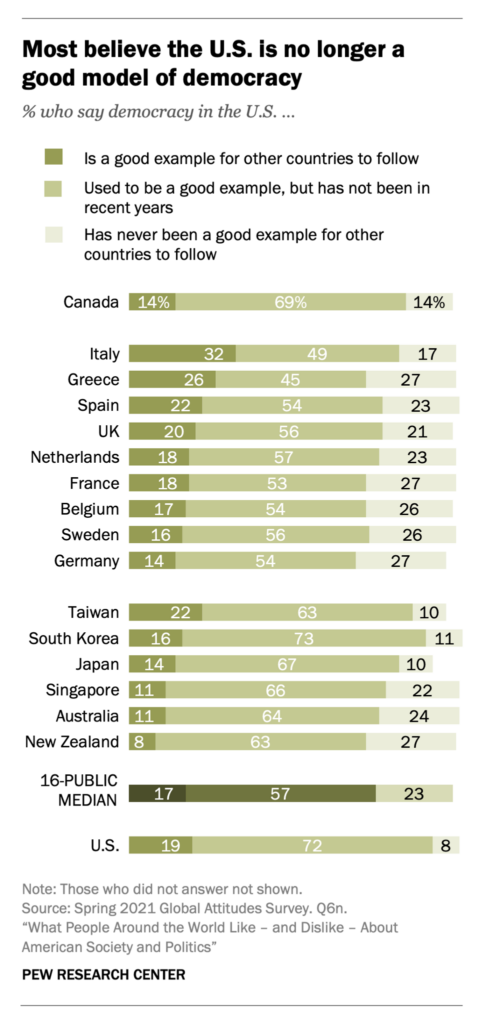 Global perceptions of US democracy have deteriorated to unprecedented negative levels, according to a new Pew Research Center poll. Meanwhile, the West’s democracies seem more interested in fighting over fish than freedom.
Global perceptions of US democracy have deteriorated to unprecedented negative levels, according to a new Pew Research Center poll. Meanwhile, the West’s democracies seem more interested in fighting over fish than freedom.
People in Taiwan, Italy and Greece were the most positive about the state of American democracy; Singapore, Australia and New Zealand the least, the Post reports.
Can US soft power recover? Harvard University’s Joseph S. Nye, Jr. asks. It would not be the first time. The US has serious problems, but it also has a capacity for resilience and reform that has rescued it in the past, he writes for Project Syndicate.
“Press freedom, independent courts, and the right to peaceful protest are among the greatest sources of America’s soft power,” he adds. “Even when mistaken government policies reduce America’s attractiveness, its capacity for self-reflection and self-correction makes it attractive to others at a deeper level.”
Is the United States in a position to promote democracy and push back against autocracy abroad, or does it need to focus primarily on its own democratic institutions and processes? War on the Rocks analysts discuss.
The reality is that the G20—whose attendees include China, Russia, India, and Saudi Arabia—has replaced the G7 as the forum of real global power. But the G7 is not being used as a kind of pre-meeting of like-minded democracies, a forum to agree on goals and strategy. Instead, it is a place to stitch up defense deals, row over sausages, and pretend that the old world still exists, the Atlantic’s Tom McTague writes.
“The West, however you define it, is still by far the most dominant economic bloc in the world, but we are now more interested in fighting over fish than freedom,” said Tom Tugendhat, the chair of the UK Parliament’s foreign-affairs committee.
The problem is that the new world—one with an array of powers, each pursuing narrow advantage and lacking a sense of grander strategy—creates a kind of double inaction, McTague adds:
In the case of Europe, Merkel’s Germany has, for the most part, not been prepared to act until it has little choice, but neither has it been prepared to deal with the consequences of its inaction: emerging crises, regional imbalance and grievance. Outside Europe, Merkel’s Germany has also resisted making choices between its security and economic interests, and resents pressure from Washington that it must.
“Both of the heads on Germany s double headed eagle are supposed to look out to the
world,” said Tom Tugendhat, the chair of the UK Parliament’s foreign-affairs committee. “Today, the reality is both are facing in.”







